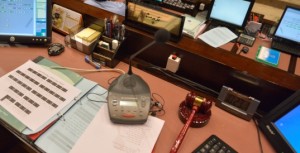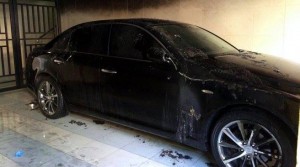A resolution submitted by the Maldivian Democratic Party (MDP) calling on all state institutions to ensure that the second round of the presidential election is held as scheduled was passed at an extraordinary session of parliament today, amid disorderly protests by MPs of the government-aligned Progressive Party of Maldives (PPM) and Jumhooree Party (JP).
The resolution was read out by MDP MP Ali Waheed over loud protests and whistle and horn-blowing by pro-government MPs. The special sitting – held during the ongoing recess upon request of 29 MPs – was adjourned shortly thereafter by Speaker Abdulla Shahid due to disorder in the chamber caused by PPM and JP MPs gathered in front of his desk.
When the sitting resumed at 1:00pm to vote on the resolution, PPM and JP MPs were occupying the Speaker’s chair as well as the secretariat desk. The vote was called by Speaker Shahid – surrounded by security guards – standing in front of the chamber well and passed with a show of hands.
According to MP Ali Waheed, the resolution was passed with 37 votes in favour. The MPs occupying the Speaker’s space and secretariat desk appeared not to participate in the vote.
The chamber was hijacked. But the voting proceeded & we won with 37 votes. Democracy will prevail. Kuriyah, Kuriyah, Baarah, Kuriyah.
— Ali Waheed (@ali20waheed) September 23, 2013
Following the adjournment of the sitting this morning, MDP MPs alleged on social media that MP Ahmed Amir – a member of the Maldives Development Alliance (MDA), which is currently backing PPM presidential candidate MP Abdulla Yameen – poured water on and damaged the parliament sound system.
The MDP resolution adopted by parliament today meanwhile states that the second round run-off scheduled for September 28 should “not be delayed for any reason” and called for all state institutions to cooperate with the Elections Commission (EC) in adherence with constitutionally-stipulated deadlines for the presidential election.
Moreover, the resolution stated that the parliament’s security services or ‘241’ committee would oversee the actions of the police and military with regard to the second round of the presidential election to be held next Saturday.
The resolution was passed while a Supreme Court case initiated by the JP seeking the annulment of the September 7 election is ongoing, with the fifth hearing taking place today.
Chaos in the chamber
 Today’s sitting took place after two previous attempts yesterday was disrupted by PPM and JP MPs who blew on whistles and a vuvuzela and gathered in front of the Speaker’s desk.
Today’s sitting took place after two previous attempts yesterday was disrupted by PPM and JP MPs who blew on whistles and a vuvuzela and gathered in front of the Speaker’s desk.
Yesterday’s sitting in the morning was adjourned after Speaker Shahid’s microphone was vandalised during the disruption.
The sitting resumed at 9:00pm but could not proceed due to similar disorder caused by PPM and JP MPs protesting in front of the Speaker’s desk.
Videos meanwhile emerged on social media showing PPM MP Abdul Raheem Abdulla using obscene language against Speaker Shahid and insulting his mother during the morning session.
Following the cancellation of the 9:00pm session, the MDP-aligned Raajje TV showed video of JP MP Ilham Ahmed, also the party’s deputy leader, take out what appeared to be pliers from his pocket and cut a cable.
Local media reported that PPM MP Abdul Raheem Abdulla and JP MP Shifaq Mufeed were injured in scuffles that broke out between pro-government and MDP MPs at last night’s sitting. The former was reportedly treated at ADK hospital last night.
Despite their apparent injuries both MPs were seen actively protesting at this morning’s session.
Speaking at a press conference last night, PPM vice presidential candidate Dr Mohamed Jameel Ahmed contended that the MDP was attempting to “cover up irregularities of the first round” of the presidential election on through the parliament.
PPM MP Abdul Azeez Jamal Abubakur told press outside parliament today that the party believed MDP’s resolution was unlawful as it involved an ongoing court case, and suggested that the Supreme Court would rule that it was unconstitutional.
Both Dr Jameel and MP Abdul Azeez alleged that the first round of the polls was rigged in the MDP’s favour, claiming that the 95,224 votes (45.45 percent) its candidate former President Mohamed Nasheed received included fraudulent votes.
Meanwhile, in a letter to MPs published on the parliament website following the incidents last night, Speaker Shahid wrote that yesterday’s attempts to proceed with the sitting were unsuccessful due to “numerous acts in violation of the People’s Majlis’ regulations.”
 “In particular, the sitting could not proceed because [computer] systems, cameras and cables in the Majlis chamber were damaged with sharp objects on a number of occasions,” the Speaker’s letter stated, expressing concern with the actions of MPs.
“In particular, the sitting could not proceed because [computer] systems, cameras and cables in the Majlis chamber were damaged with sharp objects on a number of occasions,” the Speaker’s letter stated, expressing concern with the actions of MPs.
The Speaker added that “assault, damaging Majlis property, and intimidating Majlis staff” was “unacceptable” conduct as the parliament was an institution where disputes should be peacefully resolved through discussion and dialogue.
Meanwhile, a car in the garage of Speaker Shahid’s residence was set on fire in the early hours of Monday morning. Local media reported that the car belonged to Shahid’s brother.
Shahid told newspaper Haveeru that CCTV footage showed a man with his face covered pour petrol and set the car alight, describing it as “an act of intimidation” intended to incite political unrest.
